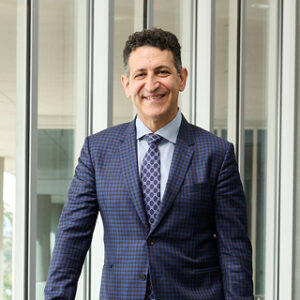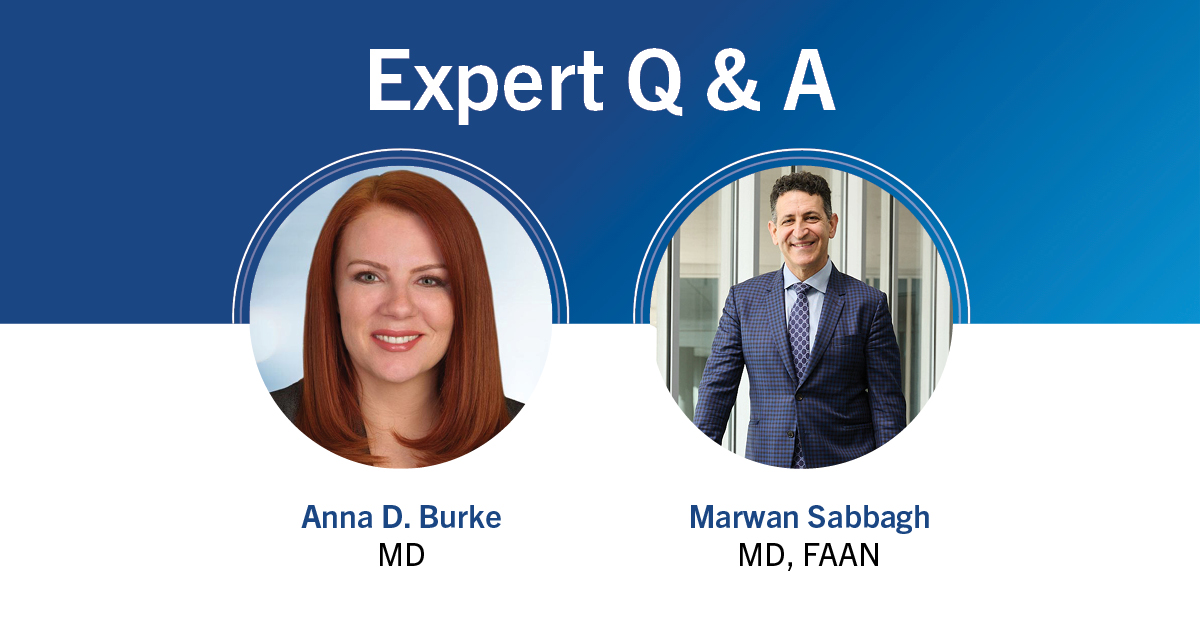Is it Alzheimer’s?
If you’re an adult in your late 40s to early 60s, you may have asked yourself this question when you’ve misplaced your car keys, had the name of a new friend slip your mind, or opened the door to a room only to realize that you can’t remember what you came in for.
Understandably, people are concerned about Alzheimer’s disease. We define who we are by what we remember—about ourselves, our family and friends, and our life experiences. Alzheimer’s slowly steals those memories away. The most challenging part of Alzheimer’s comes when a loved one no longer remembers their spouse of 50 years or their children and grandchildren. This is the painful reality for the nearly 7 million Americans living with Alzheimer’s and the 11 million family members providing full-time care.
The Barrow Difference
At Barrow Neurological Institute, more than 110 top-level clinicians and researchers are working to find better ways to diagnose Alzheimer’s, understand exactly how the disease works, design new clinical trials, develop new treatments and therapies, and provide ongoing support and resources for patients and their families.
In this blog, Anna D. Burke, MD, Karsten Solheim Chair for Dementia Research and Medical Director of the Barrow Alzheimer’s and Memory Disorders Program, and Marwan Sabbagh, MD, FAAN, Moreno Family Chair for Alzheimer’s Research and Vice Chair of Neurology Research, answer some of the most common questions about Alzheimer’s disease.
Alzheimer’s Disease Basics
Barrow Neurological Foundation: What is the difference between Alzheimer’s disease and other cognitive disorders?
 Dr. Sabbagh: Alzheimer’s disease is a kind of dementia. It is a specific disease that involves the accumulation of proteins, such as amyloid and tau, which cause degeneration of the brain. So, like cancer, there are many causes of dementia, with Alzheimer’s being the most common. About two-thirds to three-quarters of all dementia is Alzheimer’s, but there are other causes too, including Parkinson’s disease, Lewy Body dementia, vascular dementia, stroke, and much more. Alzheimer’s also tends to be progressive over time, with a loss of independence as it progresses.
Dr. Sabbagh: Alzheimer’s disease is a kind of dementia. It is a specific disease that involves the accumulation of proteins, such as amyloid and tau, which cause degeneration of the brain. So, like cancer, there are many causes of dementia, with Alzheimer’s being the most common. About two-thirds to three-quarters of all dementia is Alzheimer’s, but there are other causes too, including Parkinson’s disease, Lewy Body dementia, vascular dementia, stroke, and much more. Alzheimer’s also tends to be progressive over time, with a loss of independence as it progresses.
Diagnosing Alzheimer’s Disease
Barrow Neurological Foundation: When should patients seek help for Alzheimer’s disease?
 Dr. Sabbagh: I get this question a lot. When symptoms begin, patients may not think much of them. But, when it becomes noticeable to you, like, ‘gee, we just had this conversation three times in the last hour,’ or to others, that is when you should seek help. Other telltale features that are not a part of normal aging are getting lost in a place you have lived for years, finding that you have to make lists for everyday tasks, and repetition. Basically, if it’s a little slip of the tongue or you can’t remember someone’s name in the moment, it might be normal aging. But, when forgetfulness becomes apparent to those around you or it starts having tangible effects on your life, you should see a specialist.
Dr. Sabbagh: I get this question a lot. When symptoms begin, patients may not think much of them. But, when it becomes noticeable to you, like, ‘gee, we just had this conversation three times in the last hour,’ or to others, that is when you should seek help. Other telltale features that are not a part of normal aging are getting lost in a place you have lived for years, finding that you have to make lists for everyday tasks, and repetition. Basically, if it’s a little slip of the tongue or you can’t remember someone’s name in the moment, it might be normal aging. But, when forgetfulness becomes apparent to those around you or it starts having tangible effects on your life, you should see a specialist.
Barrow Neurological Foundation: What is the importance of early diagnosis for Alzheimer’s disease?
 Dr. Burke: One of the most important things you can do is receive an early diagnosis. Many treatment options are available, and new medications have recently hit the market. Unfortunately, these therapies can only slow the disease process; they cannot give patients back what they’ve already lost. That’s why it’s important to catch the symptoms and disease early, so you can put on the brakes, slow things down, maintain cognition, maintain function, and continue doing the things you love.
Dr. Burke: One of the most important things you can do is receive an early diagnosis. Many treatment options are available, and new medications have recently hit the market. Unfortunately, these therapies can only slow the disease process; they cannot give patients back what they’ve already lost. That’s why it’s important to catch the symptoms and disease early, so you can put on the brakes, slow things down, maintain cognition, maintain function, and continue doing the things you love.
“At Barrow, the Alzheimer’s and Memory Disorders Program is taking steps to improve early diagnosis. We are working not just in our clinic but also with primary care physicians, helping ensure that they have the tools to diagnose patients early and get them the specialty care they need.” – Anna D. Burke, MD
Advice for Navigating the Alzheimer’s Disease Journey
Barrow Neurological Foundation: Why is it important to provide wraparound care for patients and their families?
 Dr. Burke: When you get an Alzheimer’s disease diagnosis, it can be confusing and frustrating. You’re left wondering, What can I do? Or, if you’re a care partner, you may wonder, What do I do to support my loved one? That’s why having a team on your side, like the team here at Barrow, is vital. You need to know what you can do regarding diet and exercise—are there supplements you should be taking, or ones you should avoid? What’s going to make things better and what’s going to make things worse? Having that comprehensive care team is extremely important as you manage this chronic illness, and that’s exactly what Alzheimer’s is: a chronic illness that you, your family, and your treatment team will need to develop a plan for.
Dr. Burke: When you get an Alzheimer’s disease diagnosis, it can be confusing and frustrating. You’re left wondering, What can I do? Or, if you’re a care partner, you may wonder, What do I do to support my loved one? That’s why having a team on your side, like the team here at Barrow, is vital. You need to know what you can do regarding diet and exercise—are there supplements you should be taking, or ones you should avoid? What’s going to make things better and what’s going to make things worse? Having that comprehensive care team is extremely important as you manage this chronic illness, and that’s exactly what Alzheimer’s is: a chronic illness that you, your family, and your treatment team will need to develop a plan for.
Barrow Neurological Foundation: What advice would you give to patients and families who have just received an Alzheimer’s diagnosis?
 Dr. Burke: You are not alone. You’re probably going through a gamut of different emotions, and it may feel like you’re alone in this, but we’re here to help. Barrow has a whole team of cognitive specialists—doctors, nurses, social workers, physical therapists, and occupational therapists—who can help you manage this chronic illness.
Dr. Burke: You are not alone. You’re probably going through a gamut of different emotions, and it may feel like you’re alone in this, but we’re here to help. Barrow has a whole team of cognitive specialists—doctors, nurses, social workers, physical therapists, and occupational therapists—who can help you manage this chronic illness.
Looking to the Future
Barrow Neurological Foundation: How does Barrow stay at the forefront of Alzheimer’s research and care?
 Dr. Sabbagh: Barrow is a world-class institute for neurological, neuroscience, neurodegenerative, and neurosurgical care, second to none worldwide. That’s because of our culture—we always try to be the best at everything we do, including Alzheimer’s disease research and care. We ensure that patients get world-class care and access to the latest therapies and technological advances. We are always the first to look for new and innovative treatment approaches and enroll patients in clinical trials. For example, we were the first facility in Arizona to do a trial using a blood test to diagnose Alzheimer’s. Barrow is the place to come for the next big thing in Alzheimer’s.
Dr. Sabbagh: Barrow is a world-class institute for neurological, neuroscience, neurodegenerative, and neurosurgical care, second to none worldwide. That’s because of our culture—we always try to be the best at everything we do, including Alzheimer’s disease research and care. We ensure that patients get world-class care and access to the latest therapies and technological advances. We are always the first to look for new and innovative treatment approaches and enroll patients in clinical trials. For example, we were the first facility in Arizona to do a trial using a blood test to diagnose Alzheimer’s. Barrow is the place to come for the next big thing in Alzheimer’s.
Barrow Neurological Foundation: What inspires you to continue your work and research in Alzheimer’s?
 Dr. Burke: In terms of inspiration, I see people dealing with the most challenging diagnosis of their lives. Oftentimes, patients and their families know that Alzheimer’s will affect their lives, but they truly don’t understand how much until they are in the thick of it. But even during this tragic time, I see the most amazing things: family members stepping up to support their loved ones and unyielding love, compassion, and empathy. That’s what keeps me going.
Dr. Burke: In terms of inspiration, I see people dealing with the most challenging diagnosis of their lives. Oftentimes, patients and their families know that Alzheimer’s will affect their lives, but they truly don’t understand how much until they are in the thick of it. But even during this tragic time, I see the most amazing things: family members stepping up to support their loved ones and unyielding love, compassion, and empathy. That’s what keeps me going.
“As a physician, I get to see the best of humanity and help those in need of support, and as a researcher, I get to study new therapies that hopefully will cure this devastating disease.” – Anna D. Burke, MD
Impact of Philanthropic Support
Barrow Neurological Foundation: Will you say a few words about the importance of philanthropy to Alzheimer’s research?
 Dr. Sabbagh: I can’t express enough gratitude to donors who support the Alzheimer’s and Memory Disorders Program at Barrow Neurological Institute. As physicians and researchers, we always want to test new ideas, concepts, and approaches to treatment. Oftentimes, these are high-risk, high-reward studies that require proof-of-concept data. That’s where philanthropy comes in. Barrow Neurological Foundation donors provide critical seed funding for us to test these novel ideas in smaller studies. The preliminary data generated by these initial studies are essential to securing grants from outside entities for larger studies and clinical trials.
Dr. Sabbagh: I can’t express enough gratitude to donors who support the Alzheimer’s and Memory Disorders Program at Barrow Neurological Institute. As physicians and researchers, we always want to test new ideas, concepts, and approaches to treatment. Oftentimes, these are high-risk, high-reward studies that require proof-of-concept data. That’s where philanthropy comes in. Barrow Neurological Foundation donors provide critical seed funding for us to test these novel ideas in smaller studies. The preliminary data generated by these initial studies are essential to securing grants from outside entities for larger studies and clinical trials.
“All I can say is, thank you to our donors, because you make a real difference.” – Marwan Sabbagh, MD, FAAN
Donate to Alzheimer’s Research and Care
When you make an Alzheimer’s donation to Barrow Neurological Foundation, your funds help support the work of a world-class team of physicians and researchers who are committed to providing comprehensive clinical care for patients while conducting innovative research into new and more effective treatments for Alzheimer’s and related dementias.


